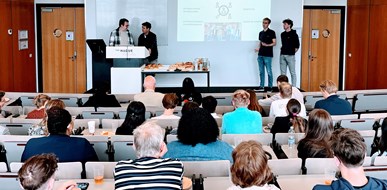From classrooms to community: Hague students bridge peace & justice disconnect
Published 12 June 2024
@Haagse Hogeschool - Students presenting their recommendations to policymakers on how to increase youth engagement in peace, justice and global cooperation.
This week, students from The Hague University of Applied Sciences presented their recommendations to increase youth engagement in peace, justice, and global cooperation. The ‘Young People as World Citizens’ project, led by the World Citizenship lectorate in collaboration with the T.M.C. Asser Instituut, bridges the gap between youth and policymakers from The Hague Municipality, the Dutch Ministry of Foreign Affairs, and Hague-based community centres and schools. Students recommended pop-up events showcasing positive police interaction, social media campaigns, youth ambassadors, and curriculum changes to raise awareness and foster a more inclusive The Hague.
The research project ‘Young People as World Citizens’, with students from European Studies and Public Administration & Government Management programmes at The Hague University of Applied Sciences (THUAS), focused on the question: “How can young people from The Hague foster a closer dialogue with policy makers, administrators and international institutions on the themes of peace, justice and international cooperation?”
The research question arose after previous THUAS research showed that the perceptions of young people from the Schilderswijk and Moerwijk neighbourhoods in The Hague seemed diametrically opposed to those of policymakers in the same city, especially on themes such as security, the importance of family, diversity and sustainable society.
For the follow-up project, policy makers and students from THUAS and Maris College visited various community centres and schools in The Hague to interview young people about access to justice, perceptions of injustice, international cooperation and the stability of public institutions. The results of the interviews showed that although young people know relatively little about these topics, they were very interested. However, the role of The Hague as the International City of Peace and Justice plays little or no role in young people’s daily lives, and is also lacking in the educational curriculum of civics or citizens projects.
Increasing basic knowledge
Under the guidance of the Asser Institute, the students visited Hague-based institutions working in the field of peace, justice, and security. They also received a training session at the Asser Institute, in collaboration with the Kinder- en Jongerenrechtswinkel, on "standing up for your rights" to prepare for the discussions between young people and policymakers, led by the students of the THUAS.
Based on the interviews, the students then formulated advice on how, among other things, the Municipality can contribute to increasing the basic knowledge of young people in The Hague about peace and justice. The students proposed a multi-faceted approach to engage young people in peace, justice and international cooperation. This included:
- Pop-up events in neighbourhoods, to showcase positive police interactions with the community.
- Social media campaigns to spread awareness about peace and justice issues through platforms young people already use.
- Youth ambassadors: Empowering young people to be spokespersons on these topics.
- International Youth Council: Creating a platform for youth voices to be heard on a global stage.
- Anti-discrimination training for police: Fostering better understanding and trust between police and the community.
- School curriculum enhancements: Integrating mentoring programmes and civics lessons that highlight The Hague's international role in peace and justice.
Earlier this week, during the final session of the research project, the students presented their recommendations to policymakers from the Municipality of The Hague, the Dutch Ministry of Foreign Affairs and representatives of community centres and schools, including three students from Maris College. According to the project coordinators, the advice was well received by policymakers. Rob Schuurmans, Deputy director of international affairs at the Municipality of The Hague, indicated that the Municipality is considering to implement the recommendations.
The ‘Young People as World Citizens’ project will culminate in a participatory research report, co-created with the input from students, youth, policymakers, and peace actors. This report will be presented at a final meeting, in cooperation with Just Peace. Researchers from the World Citizenship lectorate? and the T.M.C. Asser Institute will then build upon the project's activities and findings through further research and a peer-reviewed journal article.
Read more about the project and the partners.
Read more
Local high school students snap photos of The Hague for Human Rights Day
To commemorate Human Rights Day on December 10, the T.M.C. Asser Instituut in collaboration with Humanity House and the Visual Human Rights project, invited forty high school students from The Hague to participate in the workshop “Human rights visualised.” Read more.
